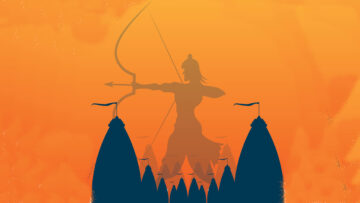परिष्वजन्ते जनयो यथा पतिं
मर्यं न शुन्धयुं मधवानभूतये
“Only when the poetry emanates from the heart of the poet, it is beautiful enough to touch the heart of the listeners and embrace him like a beloved embraces her lover.”
This shloka from the Rigveda beautifully depicts the purity residing in the poetry and the poet, and how it has become the source of bliss for this world.
Ultimate truth is the only thing which is sought after through various paths by so many different people and is really worth achieving. The classic compilation of the truthful sayings by rishis passed on through oral tradition in the sanathan practice of this world is Rigveda, the earliest scripture. This paper’s main focus is on unravelling a new theory of poetry in this modern world by researching deep down, back in the earliest of times, the root of the immense banyan of knowledge and present it in an easy and lucid way so the art of poetry shines in its true glory.
Art is the purest form of all the earthly manifestations, humans derived abstractions and all those crude concepts and theories which have developed so far with the advent of human civilization and like a torch guiding us to something more vital, more blissful, eternal and above human conceptions and towards emancipation. Poetry is first amongst all the forms of art. The creator of Ramayana, Valmiki is known as the ‘adi-kavi’, the first of poets.
There has been a long tradition of oral knowledge in India where a whole lot of knowledge from the Vedas, the Upanishads and the granthas is through shlokas, mantras, richas, etc., which are all in couplets that can be sung and carry the deepest of meanings in them. So, this is how the art of poetry has found its firm ground and a large fertile plain to flourish.
Poetry is something that is endowed with the highest level of reverence in our culture, attributed to being enlightening and representing a far-sighted yet the deepest of vision across the universe. So, it cannot be less humble for the creator of the poetry, the poet, to be revered as the ‘Creator’. This is the highest of degrees conferred on a poet in any of the civilizations so far. Since creation of poetry is a task of great achievement, it requires the multi-dimensional vision of a poet. In this sense, the poet has to be a ‘source’, too.
‘POET’
The shloka in Ishavasya Upanishad says, “The self born, all surrounding, wise and visionary goes on creating perpetually the worldly objects in their proper form-as they ought to be.”
कविर्मनीषी परिभूः स्वयंभूः
याथात्थयतोऽर्थान् व्यदधात् शाश्वतीभ्यः समाभ्यः
The couplet defines a great deal of extent to which a person can be categorised as a poet. Here the terms used for a poet are ‘kavi’ and ‘manishi’ which exemplifies a visionary. The poet has to be a person of universal vision, who can not only see far beyond the things as they appear but also deeper inside the surface until they appear.
So, this shows that a poet must be a person of profound knowledge of this world and the other world, which then can be churned into an essence and be sung like a melodious song. So, all this mental churning of the knowledge gives him a vision, a profundity in action of poetry writing, which is a divine attribute. Hence, there is no exaggeration in keeping the poet equivalent to the ‘Creator’.
Emotions work like a charge for the poetry, which carry the inherited message in it to the reader or the listener. So, the poet is someone who is charged up with emotions, moves in a row of sensations, and cause the poetry to flow out like a soothing river, as it is seen how Adikavi Valmiki uttered his first word of poetry after seeing the kronch bird in utter pain and being driven by that deep empathetic grief for that bird; it is evident that a great emotional inspiration is required for a poetry to be created.
Thus a poet is the one who is enlightened, one who has light in his life, one who has overcome darkness of his life and hence has resolved to enlighten others too. So, a resolute enlightened person who has dedication towards the betterment of this world goes on to create a better world through this ultimate form of art.
So, in conclusion to all those mentioned above, a poet can be accredited to be a ‘source of the best’, the one who accepts the best of thoughts and ideas and then synthesise those positive vibrations from all the knowledge into harmonious songs.
‘POETRY’
In Rigveda, we find a lot of terms or synonyms for poetry, which can be categorised as this-
ब्रह्मन, काव्यं – mystic, spiritual knowledge
ऋक् , ऋचा ,गोः ,द्युमनम् – light, brilliance , consciousness
धीः ,धेना ,धेनुः –intellect
मन्त्रः ,मनीषा ,सुम्नम् – mind
सूकतम् – speech
अपस् – labour intensive activity
सुवृिक्तः ,सुतष्टम् – craftsmanship
The above classification of synonyms of poetry illustrates the characteristics of poetry and the level of degree of human actions required to produce a fine poetry from craftsmanship at the bottom to the mystic knowledge at the top. The most commonly used word for poetry in Veda is ‘richa’ which means a streak of light or a flash of light.
This shows that poetry is enlightening, something which clears away the clouds of darkness and when it is said to be the light, it means it must have the source and that source is the poet. The word for poet which often comes in Rigveda is ‘SURI’ which has its origin in the root of ‘surya’, the sun. Hence, it is justifiable to simply call poetry great and brilliant.
The other aspect of poetry shown in Rigveda qualifies it better in the following verse-
“The hundredfold inexhaustible treasure of truth is the primeval source, the father of poetry” (RV 3.26.9)
Poetry is pure, truthful and righteous. Poetry must always contain the truth and propagate it across the universe. It means poetry is always for the ‘welfare of people’ because it is the cause of awareness and a sense of seeking truth in the minds of the readers.
To sum up the definition of poetry, it can be said in a better way as
Poetry is the literal form of all the energies enshrined in nature, and when realised and contemplated deeply by the poet it is manifested with limitless scopes of meanings but one truth.
When we see the qualities of the poetry, the following verse from Rigveda says it-
सुक्तमिव तितउना पुनन्तो यत्र धीरा मनसा वाचमकृत
“Careful selection of the most appropriate words and expressions leaving aside the rest, with the sieve of his mind, as one does in the case of saktum (the flour of parched gram and barley) which is cleaned by passing through a sieve.”
So the selection of words is the most important thing for the composition of poetry, which is a task of ultimate refinement.
In verse 3.1.8 of Rigveda, sage Vishvamitra remarks that when the poets start glorifying Lord Indra with their poetry, the streams of honey and clarified butter start flowing, using phrases like ‘उर्मयो घृतस्य’. It means, in order to get a highly refined, sophisticated, and a pure by-product called ‘ghee’, butter has to be clarified through various complex rigorous processes; in the same way, poetry is also a result of continuous churning and purification which results into a great work of art.
Similarly, the comparison with honey indicates the quality of poem to be sweet and mellow, which is melodious to ears and satisfying to the heart. This quality is known as ‘madhurya’ which has been explained by later critics like Mammat.
The other nature of poetry is ‘ojas’, which means vigorous and powerful construction of the right words. The power lies in truth itself; if the poetry expresses truth, it qualifies to be ‘ojaswi’ and the last thing that poetry must have in it is ‘prasaad’ which means clarity and simplicity. Simplicity is something which is adored in this world like no other thing.
Ultimately all this results into bliss and emancipation, the ‘brahmananda’. We see the poet to be in ultimate bliss while composing poetry and the reader to be bliss while reading it. Hence this is a process of realising the ultimate truth within and making the other person too realise the same. So, it can be said that-
Poetry is something that culminates in bliss and emancipation experienced by the artist as well as the cause of bliss and emancipation for the devoted seeker.
Reference
- Tripathi,G.C., The Poet and Poetry in Rigveda, www.sanskrit.nic.in
Disclaimer: The opinions expressed in this article belong to the author. Indic Today is neither responsible nor liable for the accuracy, completeness, suitability, or validity of any information in the article.








